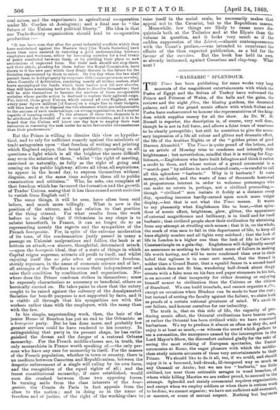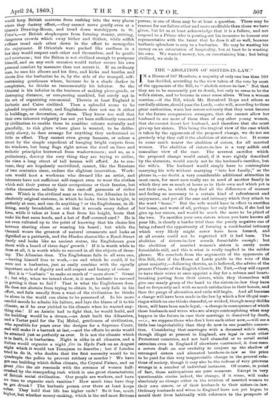" BARBARIC " SPLENDOUR.
91EIE Times has been publishing for some weeks very long accounts of the magnificent entertainments with which the Pasha of Egypt and the Sultan of Turkey have welcomed the Prince and Princess of Wales, of the balls and the galas, the reviews and the night fifes, the blazing gardens, the decorated palaces, and all the grand scenic effects with which Sultan and Pasha have endeavoured to honour the representatives of the kingdom which supplies money for all the show. As Dr. W. Russell is reporter, the description is, of course, very well done, though he is not in full force, and allows a faint trace of weariness to be clearly perceptible ; but still he contrives to give the necessary impression of a life all colour and glitter and dramatic effect, the life of the Arabian Nights or of the "golden prime of good liaroun Alraschid." The Times is quite proud of the letters, and in an article of Monday tries to condense and intensify their brightnesses ; but nevertheless, mindful that it is writing for Englishmen,—Englishinen who have built Islington and think it rather a credit to them, and whose notion of a grand ceremonial is a " march-past " by soldiers in mud-coloured coats,—is careful to call all this splendour "barbaric." Why is it barbaric ? It costs money, no doubt, and the waste of tens of thousands borrowed at preposterous interest in order to welcome personages who can make no return is, perhaps, not a civilized proceeding,— though " civilized " men imitate it feebly at a distance every day, spending incomes hardly-earned upon much more vulgar display,—but that is not what the Times menus. It wants to say pleasantly what Englishmen like to hear,—that splendour of scenic effect, brightness, glow, glitter, the appearance of external magnificence and brilliancy, is in itself and for itself barbaric ; that civilized people show their civilization by abstaining from any attempt at rivalling such scenes ; that it is, on the whole, the mark of whys men to fail in this department of life, to keep all hues slightly sombre and all lights very subdued ; that the look of life in London is a higher one than the look of life in Cairo or Constantinople on a gala-day. Englishmen will delightedly accept an assurance so soothing to their latent sense of failure in making life worth having, and will be more confirmed than ever in their belief that ugliness is in sonic sort moral, that the Strand is nobler than a Grand Bazar, that a squalid Saxon in a second-hand coat which does not fit him, wandering half-drunk about dingy streets with a false nose on his face and paper streamers in his hat, is on account of that incapacity for either dressing or enjoying himself nearer to civilization than the Cairene or the citizen of Stamboul. We can build ironclads, and cannot organize a fête, except on occasions when Hindoos can be made to bear the cost ; but instead of setting the faculty against the failure, we claim both as proofs of a certain national greatness of mind. We exult in our failure, and honour ourselves for our imbecility. The truth is, that on this side of life, the capacity of producing scenic effect, the Oriental civilizations have beaten ours, or rather the Oriental has been civilized while we have remained barbarians. We try to produce it almost as often as they do, and enjoy it at least as much,—as witness the crowd which gathers to see a coronation, the annoyance caused by the interruption in the Lord Mayor's Show, the discomfort endured gladly for the sake of seeing the most striking of European spectacles, the Easter ceremonies at Rome, the eager pleasure with which the midcle-. class study minute accounts of these very entertainments to their Prince. We should like to do it all, too, if we could, and should enjoy it in a bemused, half-drunk, ill-tempered way as much as any Osmanli or Arabs ; but we are too "barbaric," too little civilized, too near those estimable savages in woad breeches, of whom while killing Maories we are rather proud., to succeed attempt. Splendid and stately ceremonial requires organization, and except when we employ soldiers or when there is serious work to be done, we cannot organize; we have not sufficient self-restraint, or manner, or sense of mutual respect. Nothing but bayonets would keep British matrons from rushing into the very places where they destroy effect,—they cannot move gently even at a Queen's Drawing-Room, and tread down worshippers in St. Peter's,—or British shopkeepers from forming steamy, striving, dangerous crowds which sway hither and thither, while selfish ruffians tread each other down in the effort to monopolize the enjoyment. If Orientals were packed like sardines in a box they would respect each other and themselves, and be gentle and courteous ; but the Briton is not civilized enough to postpone himself, and on any such occasion would rather secure his own personal comfort by massacre than not secure it. If an ordinary man, he uses his elbows and his fists, and kicks and hustles and shouts like the barbarian he is, by the side of the tranquil, selfrestraining gentleman whom, because he is a shade darker in complexion, he thinks so immeasurably his inferior. So the Oriental is his inferior in the business of making piece-goods, or destroying distance, or conquering mankind, but surely not in the art of organizing ceremonial. Therein at least England is barbaric and Cairo civilited. Then a splendid Beene to be splendid requires colour, and Englishmen dare not use it either in buildings, or decoration, or dress. They know too well that their own inherent vulgarity has not yet been sufficiently removed by civilization to enable them to combine colours naturally and gracefully, to risk glare where glare is wanted, to be deliberately showy, to dare arrange for anything they understand so little as effect. They cannot even group banners, or colour a street by the simple expedient of hanging bright carpets from the windows, but hang flags right across the road on lines and rsthetic principles borrowed from washerwomen ; and so, as a preliminary, destroy the very thing they are trying to utilize, the vista a long street of tall houses will afford. As to costume, they are hopelessly uncivilized, cannot, like the Russians of two centuries since, endure the slightest innovation. Workmen would hoot a workman who dressed like an artist, and labourers have not sufficient self-respect even to wear the clothes which suit their purses or their occupations or their fancies, but clothe themselves sullenly in the cast-off garments of richer men. Which is the civilized man as to dress, the Albanian in his absolutely original costume, in which he looks twice his height, is perfectly at ease, and can do anything ? or the Englishman, in Rifting, seedy broadcloth, so cut that it reveals every defect of form, while it takes at least a foot from his height, boots that make his feet seem hoofs, and a hat of fluff-covered card ? He is not even cultured up to the point of knowing that hie choice lies between shaving clean or wearing his beard ; but while the Osmanli wears the greatest of natural ornaments and looks as dignified as a patriarch, and the 'Endo° shaves like a Bond-Street dandy and looks like an ancient statue, the Englishman goes about with a beard of three days' growth ! If it is worth while to drees at all, it is worth while to succeed in all the objects of dressing. The Albanian does. The Englishman fails in all save one, —leaving himself free to work,—an end which he could, if he were not a barbarian, just as easily combine with the equally -important ends of dignity and self-respect and beauty of colour.
But it is " barbaric " to make so much of "mere show." Grant it; but why, when we intend show, is it more barbaric to succeed in getting it than to fail ? That is what the Englishman does. He does not abstain from trying to obtain it, he only fails in his effort, and fails usually from a want of the civilization he thinks he alone in the world can claim to be possessed of. In his more candid moods he admits his failure, and lays the blame of it to his 'Climate, as if he ever yielded to his climate when he wanted anything else ! If an Asiatic had to fight that, he would build, and the building would be a dream,—an Arab built the Alhambra, and a Tartar paid for the Taj Mehal, gentlemen of civilization, who squabble for years over the designs for a Supreme Court, and will make it a barrack at last,—and the effects he seeks would be. .attained just as perfectly as ever. It is not the climate which is in fault, it is barbarism. Night is alike in all climates, and a Sultan would organize a night fête in Hyde Park on an August eight which it would tax Tennyson to describe ; but if London tried to do it, who doubts that the first necessity would be to quadruple the police to prevent robbery or murder ? We have got one building which defies climate, the Crystal Palace, and on great fetes the air resounds with the screams of women halfCrushed by the stampeding rush which is one great characteristic of British social civilization. Our people are workers, and have no time to organize such vanities ? How much time have they t° get drunk? The barbaric person over there at least keeps sober. They hold that life has higher ends? So it has, much higher, but whether money-making, which is the end most Britons
pursue, is one of them may be at least a question. There may be reasons for our failure other and more creditable than those we have given, but let us at least acknowledge that it is a failure, and not respond to a Prince who is pouring out hia treasures to honour our representative with the taunt that he does it all so well, because barbaric splendour is easy to a barbarian. He may be wasting his money on an ostentation of hospitality, but at least he is wasting his own. We wasted money, too, on entertaining him ; but being civilized, we stole it.































 Previous page
Previous page